|
|
|
Sort Order |
|
|
|
Items / Page
|
|
|
|
|
|
|
| Srl | Item |
| 1 |
ID:
081451
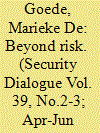

|
|
|
|
|
| Publication |
2008.
|
| Summary/Abstract |
In the context of the `war on terror', techniques of imagining the future have taken on new political significance. Richard Grusin has coined the term `premediation' to describe the way in which news media and cultural industries map and visualize a plurality of possible futures. This article examines the relation between the politics of risk and premediation as a security practice. Premediation simultaneously deploys and exceeds the language of risk. Its self-conscious deployment of imagination in security practice feeds economies of both anxiety and desire
|
|
|
|
|
|
|
|
|
|
|
|
|
|
|
|
| 2 |
ID:
110775
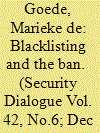

|
|
|
|
|
| Publication |
2011.
|
| Summary/Abstract |
This article examines the practice of targeted sanctions as they are deployed against individuals and groups suspected of financing and facilitating terrorism in Europe. Substantial academic attention and critique has surrounded targeted sanctions and blacklists, as these practices challenge existing logics of evidence, criminal culpability and proportionality. This article seeks to move the analysis of blacklisting beyond the breach of individual rights and toward an understanding of the wider political implications. It draws upon the work of Giorgio Agamben to offer a reading of blacklisting in terms of its symbolic function of banishment and exclusion, which simultaneously redraws the boundaries around normal, valued, ways of life. The article teases out the exceptional and pre-emptive nature of blacklisting as a security measure. It analyses in some detail the Kadi case before the European Court of Justice, and argues that blacklisting and its current contestations work to inscribe the principles of pre-emption into the international juridical order.
|
|
|
|
|
|
|
|
|
|
|
|
|
|
|
|
| 3 |
ID:
157724
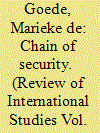

|
|
|
|
|
| Summary/Abstract |
Increasingly, private companies – including Twitter, airlines, and banks – find themselves in the frontline of fighting terrorism and other security threats, because they are obliged to mine and expel suspicious transactions. This analytical work of companies forms part of a chain, whereby transactions data are analysed, collected, reported, shared, and eventually deployed as a basis for intervention by police and prosecution. This article develops the notion of the Chain of Security in order to conceptualise the ways in which security judgements are made across public/private domains and on the basis of commercial transactions. Drawing on the work of Bruno Latour, this article understands the security chain as the set of practices whereby commercial transactions are collected, stored, transferred, and analysed, in order to arrive at security facts. Understanding the trajectory of the suspicious transaction as a series of translations across professional domains draws attention to the processes of sequencing, movement, and referral in the production of security judgements. The article uses the chain of financial suspicious transactions reporting as example to show how this research ‘thinking tool’ can work. In doing so, it aims to contribute to debates at the intersection between International Relations (IR) and Science-and-Technology Studies (STS).
|
|
|
|
|
|
|
|
|
|
|
|
|
|
|
|
| 4 |
ID:
164647
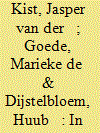

|
|
|
|
|
| Summary/Abstract |
Country-of-origin information has secured a central place in European asylum systems, underpinning state decisions on the asylum status of refugee populations. All European states produce this type of information, and dedicated country-of-origin information units are increasingly common. This article analyzes the knowledge politics of country-of-origin information, with a focus on the relation between knowledge and decision. We are interested in this type of knowledge precisely because it is uneasily positioned in-between social scientific methodology and policy decision-making and is infused with a “pulsional normativity.” We distinguish three phases of country-of-origin information production: first, a phase of investigation, where foreign lands are reduced to stable and mobile forms so that they can be studied as research units; second, the concordance of information production, relying on standardized instruments and practical skill; and third, the consolidation phase, which involves the return of country information constructed inside research units back into the administrative and regulatory world. The final section of the article examines how complex and frail information about countries of origin becomes deployed as valid grounds for asylum decision-making.
|
|
|
|
|
|
|
|
|
|
|
|
|
|
|
|
| 5 |
ID:
134472


|
|
|
|
|
| Summary/Abstract |
Nearly 15 years after 9/11, it is time to grapple with the way in which imperatives of preemption have made their way into routine security practice and bureaucratic operations. As a growing literature in security studies and political geography has argued, preparing for catastrophe, expecting the worst, and scripting disasters are central elements of contemporary, speculative security culture. One of the most-discussed findings of the 9/11 Commission Report was that US security services had insufficiently deployed their imagination to foresee and preempt the attacks. This article introduces a special issue that offers a range of in-depth empirical studies that analyse how the imperative of ‘routinizing the imagination’ plays out in practice across different policy domains. It deploys the lens of performativity in order to conceptualize and explain the materialization of preemption and its situated entanglements with pre-existing security bureaucracies. We detail the idealized traits of a ‘security of the interstice’, which include interoperability, emergence, flexibility and analytical foresight that are meant to bridge the perceived gaps of security spaces and the temporal bridges between present and possible futures. The lofty rhetoric of preparing for the worst and bridging the gaps encounters numerous obstacles, challenges and reversals in practice. As becomes clear through the notion of performativity, such obstacles and challenges do not just ‘stand in the way’ of implementation, but actively shape the materialization of preemption in different sectors.
|
|
|
|
|
|
|
|
|
|
|
|
|
|
|
|
| 6 |
ID:
130989
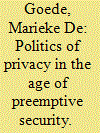

|
|
|
|
|
| Publication |
2014.
|
| Summary/Abstract |
In August 2013, a report was leaked to the Washington Post in which it was revealed that the US National Security Agency (NSA) violated its own privacy rules 2,776 times over a one-year period (Gellman 2013). The privacy violations documented in the report range from technical errors to serious violations such as operations without consent from the Foreign Intelligence and Surveillance (FISA) court and breach of the five-year data retention period. Other breaches are described as "broad syntax" errors, which are related to imprecise queries. This type of fault is presumed reducible "if analysts had more complete and consistent information available about … targets."1 Following the recent disclosures concerning the NSA's PRISM program, which has the capacity to search and connect numerous social network databases in the name of security, the importance of the publication of this privacy report cannot be overestimated. While much of the public discussion concerning PRISM has so far focused on the person of Edward Snowden and his unlikely journeys to Hong Kong and Russia, relatively few questions have been raised about the value and legitimacy of the PRISM program itself. The Washington Post revelations concerning the NSA privacy breaches have grabbed the headlines and may lead to Congressional Hearings (Blake 2013). As with other security and surveillance programs, privacy is a key anchor for critical questioning and public debate
|
|
|
|
|
|
|
|
|
|
|
|
|
|
|
|
| 7 |
ID:
124426
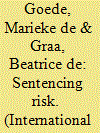

|
|
|
|
|
| Publication |
2013.
|
| Summary/Abstract |
In debates on the preemptive measures of the war on terror, criminal law is often regarded as the antithesis to exception-a conventional mode of response that acts on the basis of past harm. Since September 11, 2001, however, significant new terrorism laws have been adopted in most countries in order to make possible the disruption and prosecution of potential terrorists engaged in preparatory activities. Thus, ancillary acts undertaken increasingly in advance of actual violence are brought within the remit of criminal law. This paper engages the question of the precautionary turn in criminal law itself, and how it plays out in actual courtrooms. We examine the terrorist trial as a performative space where potential future terror is imagined, invoked, contested, and made real. By focusing on the cases of the Hofstad group in the Netherlands, and the Rhyme trials in the UK, the paper examines how present criminal offenses involving terrorist aims and intent are constituted through the appeal to potential future violence. In conclusion, the paper teases out the political dynamic of secondary risk management that-frequently-underlies contemporary terrorism prosecutions.
|
|
|
|
|
|
|
|
|
|
|
|
|
|
|
|
| 8 |
ID:
152731
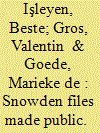

|
|
|
|
|
| Summary/Abstract |
In the wake of the disclosures by Edward Snowden about NSA surveillance practices, a series of public hearings was held before the Civil Liberties, Justice, and Home Affairs (LIBE) Committee of the European Parliament in 2013–2014. These hearings offer a wealth of information concerning the details of Snowden’s claims, their implications for privacy rights, and the way in which the transatlantic political dialogue on these issues is unfolding. However, they have yet to receive academic attention. This article suggests that the LIBE Hearings were an important platform that rendered the contested Snowden files into public evidence of contemporary surveillance practices. Drawing on the concept of “material publics” proposed by Noortje Marres and others, we examine how the material setting of LIBE was crucial to the ways in which the Snowden files were made public in Europe. Valid evidence was produced, legal issues were identified, technological solutions were fostered, and responsibilities were enacted and denied.
|
|
|
|
|
|
|
|
|
|
|
|
|
|
|
|
|
|
|
|
|